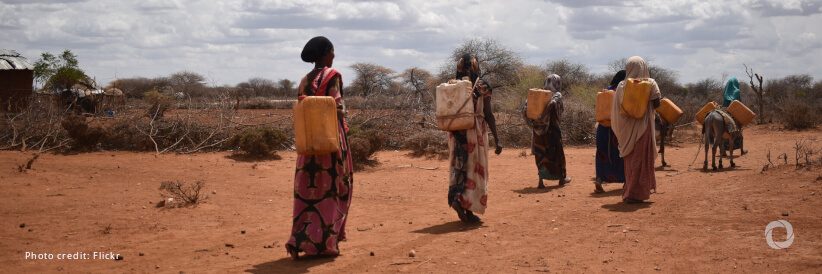Southern Africa is on the brink of a devastating hunger crisis as a relentless drought tightens its grip. El Niño has led to searing heat that led to massive crop failure causing water sources to dry up. As a result, millions of people in Malawi, Zimbabwe, and Zambia have been driven towards starvation.
To highlight this crisis, CARE alongside the Human Science Research Council, FANRPAN, and Rural Women’s Assembly held a press conference on 22nd April 2024 to call for international donor support to combat the worsening crisis.
“The situation is dire and demands urgent and coordinated action to avert a catastrophe,” emphasized Matthew Pickard, CARE Southern Africa Regional Director. “We are particularly concerned by the impact of this emergency on women and girls who form the backbone of local communities. who have had their farms scorched by the intense sun. At the same time, the cholera outbreak affected Malawi, Zambia, and Zimbabwe over countries leading to hundreds of deaths whilst recovering from four years of intense cyclones. We need to support affected communities already impacted by the drought to avert disaster.”
In Malawi, El Nino has affected close to 4.4 million people due to below-normal rain and scorching temperatures. This caused maize, a staple food for many, to be severely affected across the nation. Additionally, other crops such as rice, groundnuts, and soya beans have suffered substantial losses, threatening food security and livelihoods. Forecasts predict a significant drop in crop yields and increased vulnerability among homes that depend on agriculture for sustenance.
Over 2.7 million Zimbabweans are in need due to prolonged dry spells resulting in complete crop failure in many areas. Government indications show that 26% of people in rural areas will have a cereal shortage, further worsening a dire hunger crisis there. The situation is compounded by economic stress and livestock losses even as the country reels from a cholera outbreak that led to over 560 fatalities. Livestock diseases and water scarcity have worsened this situation.
In Zambia, the drought has impacted 9.8 million people. Delayed rains and wilting crops led to a national disaster declaration in February. Food prices surged 45%, worsening hunger. 84 districts in 8 provinces are affected, impacting 14.8 million. A March assessment found alarming food insecurity: 76% with limited food stocks, 5.7% with none, and 75.7% resorting to severe coping mechanisms. Crop damage is 50-90%, and water scarcity has forced 30% to seek alternative sources. At the same time over 740 people have succumbed to Cholera in what has been identified as the deadliest outbreak the country has experienced.
To address the escalating crisis, CARE is launching a comprehensive response plan focused on providing essential assistance to affected communities. This includes support in food and nutrition provision, revenue generation recovery by promoting sustainable farming practices, provision of clean water and sanitation services to mitigate health risks, education, and protection by ensuring access to education for vulnerable groups and raising awareness about gender-based violence and protection mechanisms.
“Our immediate priority is to save lives and alleviate suffering,” added Matthew. “But we also recognize the need for long-term solutions to build resilience and address the underlying causes of vulnerability. We call upon donors and governments to support the scale-up of humanitarian assistance. The clock is ticking. Let’s act together to save lives in Southern Africa.”

